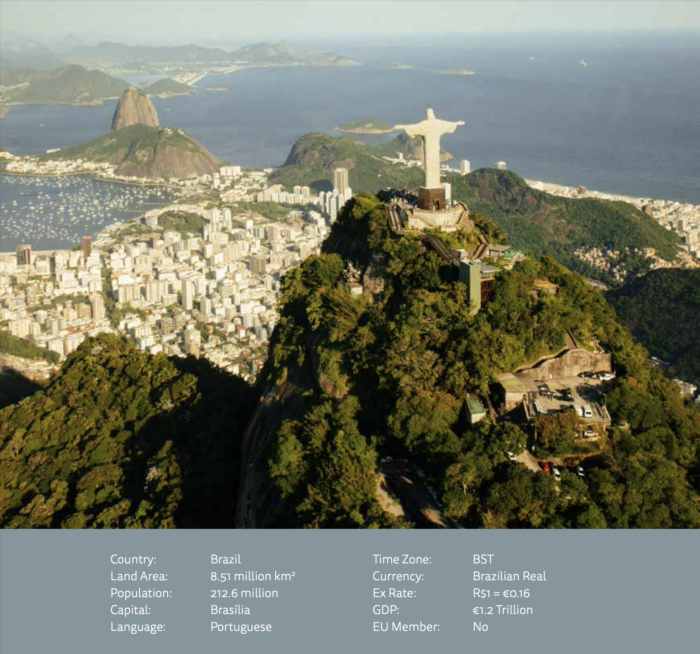
Until the arrival of the Europeans, Brazil was settled by stone-age tribes. When the Portuguese arrived in 1500, Pedro Alvares Cabral claimed the land for Portugal and the first settlement was founded in 1532. The primary export was sugar and Brazil continued to expand through wars and battles. The Portuguese defeated the French to take Rio de Janeiro and also took over several Dutch and British outposts. Soon, Brazil was one of the largest territories in the world. Today, it is the 5th largest country in the world.
In 1807, the Portuguese royal family escaped from Napoleon and fled to Brazil. Although the king, Dom Joao VI later returned to Portugal, his son remained in Brazil and became emperor. He declared independence for the country in 1822.
In 1889, Deodoro Da Fonseca led a coup, and the emperor changed the government to a constitutional republic. Ever since, the country has been ruled by presidents as well as by one military dictatorship. Currently, the country is ruled by Jair Bolsonaro.
Principal Industries in Brazil
Brazil’s major industries include iron and steel production, automobile assembly and petroleum processing. Agriculture accounts for the majority of exports.
Other Important Industries
Smaller but still significant industries include textiles, chemicals production, cement, lumber and aerospace. Over recent years, the tech sector has been growing rapidly but has not yet outpaced traditional industries.

Doing Business in Brazil
After a number of years of recession and of course the effects of the pandemic, Brazil’s economy is not only showing signs of recovery but is actually growing. Unemployment is coming down; inflation is under control and both imports and exports have started to increase. With this in mind, it seems like Brazil might be worth a look but there are still problems. Reforms are needed particularly in corruption, red tape and welfare. But, a growing market attracts investment and Brazil still has a lot going for it. Leaving the pandemic aside, Brazil has a big population, a GDP of €1.2 trillion and the largest economy in South America. What’s more, Brazil is overflowing with natural resources and has rapidly growing opportunities in a wide variety of sectors, such as technology, science, agriculture, energy, water, waste, infrastructure and health, among others.
The View from the Ground
When describing a country and its culture, you can write down all the facts and figures you like but if you want the full story, you need to get the perspective of someone with a lived experience of being there. That’s why we’ve asked Antônio to give us his take on what it’s like to live and work in Brazil.
The one word you’ll never hear in a Brazilian business meeting is the word “no”. You’ll hear lots of other things, “I’ll think about it”, “yes”, “maybe”, “let’s see” but “no”, never. The Brazilians have a very indirect communication style. They will say they’re indirect so as not to offend anyone and it’s not restricted to business meetings either. They will also act this way with their friends and family. The thing is though, when a person is there in front of them, they are very indirect, extremely polite and so on, but when a person leaves, they may say bad things about him, which can come across as a bit two-faced.
Brazilian companies have a very strong sense of hierarchy. In fact, it’s so strong that an employee would never dream of going over their line manager’s head. I know that modern thinking in the Netherlands and elsewhere thinks this is an old-fashioned way of doing things but in Brazil, you do whatever your manager says without question. You never ask whether a decision is the right one or not, you simply accept it and do it. And, while Brazil has a very masculine driven culture, in professional life, it does not matter if your boss is a man or a woman, you do what they say regardless. What’s more, if you don’t agree with your boss’ decisions, you don’t tell them, but you start chit chatting around with your colleagues instead. These informal conversations will weaken the boss’ position as, rather than direct questioning, you’ve enabled the process to happen through rumour.
In terms of meetings, the first thing you need to know is that everyone will be 10 minutes late. The atmosphere is very friendly and relaxed. Even with people you’ve never met before who are like CEOs or whatever, they will invite you to call them by their first name. There will be a little small talk followed by everyone complaining to each other about politics and football. Eventually, someone will mention business and then the conversation will slowly get back to more work-related topics and the reason the meeting was called in the first place. When scheduling your diary, you should always allow enough time for your meetings with a little wiggle room to allow for the inevitable overrun.

As for setting up meetings, you don’t necessarily need a network like you might in other countries. In Brazil, you can easily do cold calling without the need for a network. Cold emailing works extremely well too, possibly even better than cold calling actually. In fact, with the cold emails, it doesn’t even have to be personalised. There are no GDPR regulations in Brazil so for that reason, you don’t need to personalise emails. To give you an idea of the lack of privacy laws, the most popular television program here is all about murders and police operations which have taken place during the day, and you can see all the victims and suspects with their full names and unpixellated faces on national television. Privacy hardly exists here at all.
Regarding relationships with other countries, it can be difficult because Brazilian people only speak Portuguese. Now, the new generation that’s coming through, people between 25 and 35 years old are more likely to speak or be learning to speak English. They don’t speak English as well as people in the Netherlands do but that’s because they never get to use it. When you’ve got a population of over 200 million people and you’re the largest country in South America with a huge internal market, speaking English is not an immediate concern.
Internationally speaking, relations are largely focused on the United States with a strongly held belief that if you can make it in the United States then you’ve made it in life. Production wise, in the United States a lot of the products come from China, but the raw materials China uses for that production are largely exported by Brazil.
Portugal is a favoured country as it is seen as the gateway to Europe for Brazilians. The fact that they can speak the language makes it easier for Brazilians to get a foothold in the country and if they stay for 5 years, they can become a Portuguese citizen and get a European passport. They can then live and work anywhere they want in the European Union. Actually, I’m not sure how close the two languages are. I speak fluent Brazilian Portuguese but find it difficult to understand original Portuguese, so I don’t know how they do it. It is a bit like Dutch versus Flemish with a strong accent. Culturally there are a lot of differences as well and Portugal is very small so not many Brazilians want to go there. In fact, there’s not much migration from Brazil at all and most people who do leave Brazil tend to head in the direction of the U.S. There are a lot of Brazilian computer engineers at the moment, and I know that Google and Facebook’s main engineers are Brazilians. They’re all very good at programming, so they’re going all over the world right now.
Of course, the engineers who don’t speak English still live in Brazil, so the start-up scene is massive. I can honestly say that the tech start-up rate in Sao Paulo is even bigger than in Tel Aviv. There are more unicorns than ever before, and I read that the investment in start-ups last year has quadrupled. Also, a lot of the big companies from the United States and from China are investing there as well, so it’s very exciting at the moment.
In terms of scaling within Brazil, it’s very, very possible. As I’ve already said, it’s a population of 200 million people and a huge market. Also, if you’re big in Brazil, it’s easy to translate your system from Portuguese to Spanish and then you can expand through the rest of Latin America. There are also opportunities for companies that want to scale into Brazil. If you’re a Portuguese company that wants to scale to Sao Paulo there are possibilities. Plus, as you are coming from the first world, European businesses are automatically respected by the people there which is a massive advantage. They’ll trust you more than a Brazilian company with a similar product.

I mentioned that the US and Portugal are favoured trading nations, but you could definitely add Germany to that list. They have a good reputation in Brazil. The one country we can’t stand is Argentina. I mean we’re fine to work with them for business but when it comes to football, they are our biggest rivals, and the fans are really passionate about games between these two countries. Other than that, we tend to get on with everyone. It occurred to me that South America is very different to Europe. Europe has been shaped by wars and invasions, so it’s been in our DNA that we need to protect ourselves, that we need to protect our land and our property. In Brazil though, there has never been a war there so people don’t need to protect themselves. That’s why they’re so open and friendly. Don’t mention politics though. Seriously, just don’t bring it up, not at work, not socially and not within earshot of anybody. The situation is so binary and so divisive that just expressing an opinion could be dangerous. It’s a kind of an “either you’re with me or you’re against me” scenario.
To lighten the mood a bit, we like to have a laugh in the office. Often, we make jokes by using the double meanings of words. It’s very much language related. So, they used to make terrible fun of me in the office as a non-native speaker. I got caught out quite a few times. If anything though, it spurred me on to become fluent. We also make jokes about Portuguese people. Like the Dutch make jokes about the Belgians, the Brazilians joke that the Portuguese are silly or whatever. It’s always the same character in the jokes, a man called João. So, it would be like, “Hey, did you hear that João went to the supermarket?” and then the joke starts.
The Brazilians really like to enjoy life and the weekend is where it all happens. From Monday to Friday, they work and study really hard and then on Friday afternoon, they switch off and really go to enjoy themselves. For 48 hours, it’s barbecues, and the booze never stops. It’s properly full on. If you need to sleep, you go to sleep, wake up and back to the barbecue again. It just goes on and on and everybody’s welcome. That’s something that’s very Brazilian. If I’m alone on a Friday afternoon with nothing to do for the weekend and then my colleague says he’s going to see his family in the mountains, I’ll get invited to go with him. And, it’s really normal that you go, even without knowing anyone there. Also, you have a really good time because you’re welcomed straight away. It’s good fun and everybody is interested in getting to know you and I think that’s very Brazilian. It’s also worth noting that if you invite some people for a party or dinner at home, don’t be surprised if they bring four other people without asking. So, always cook extra food and just go with it.
Business Etiquette
The Brazilians have a somewhat flexible approach to timekeeping, but you should aim to be punctual anyway. The normal greeting is a handshake and initially at least, use everyone’s proper title such as Sir, Doctor or Engineer. The dress code is normally formal and conservative although this may be different depending on your domain. During meetings, it is usual to engage in small talk before discussing business.
As for behaviour, it is recommended to establish eye contact. Do not be offended if the other party takes a phone call during your meeting; it is not viewed as a sign of disrespect. Expect negotiations to be carried out in Portuguese. It is ideal to let the counterparty bring up business affairs. Remember that in Brazilian culture, interruptions are a sign of interest in the subject.
